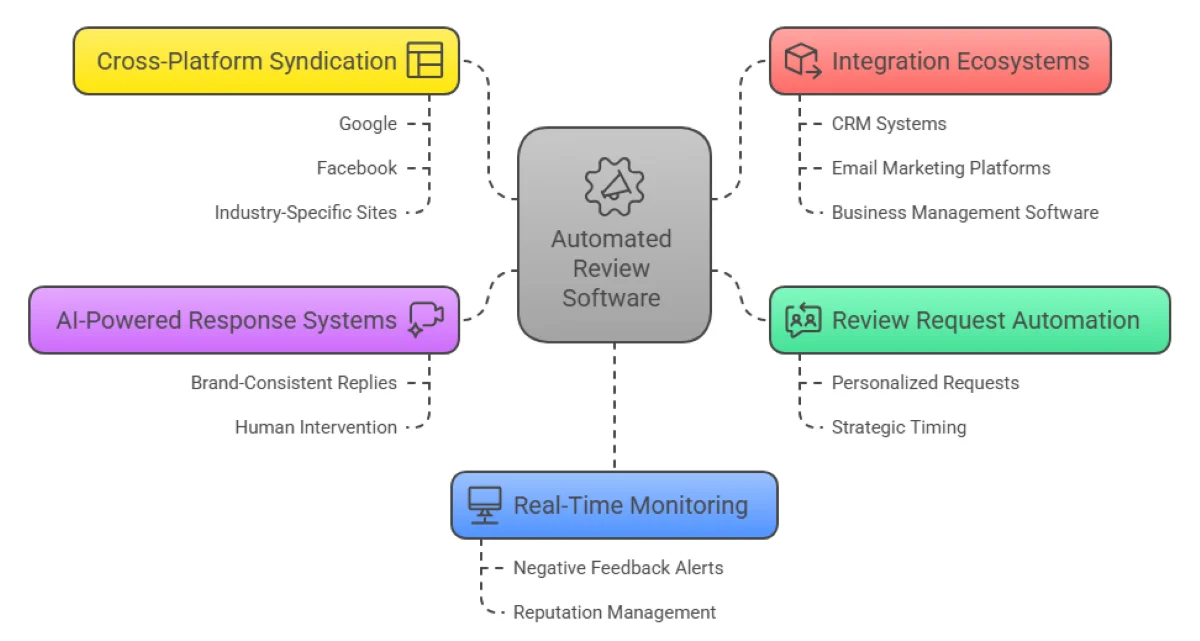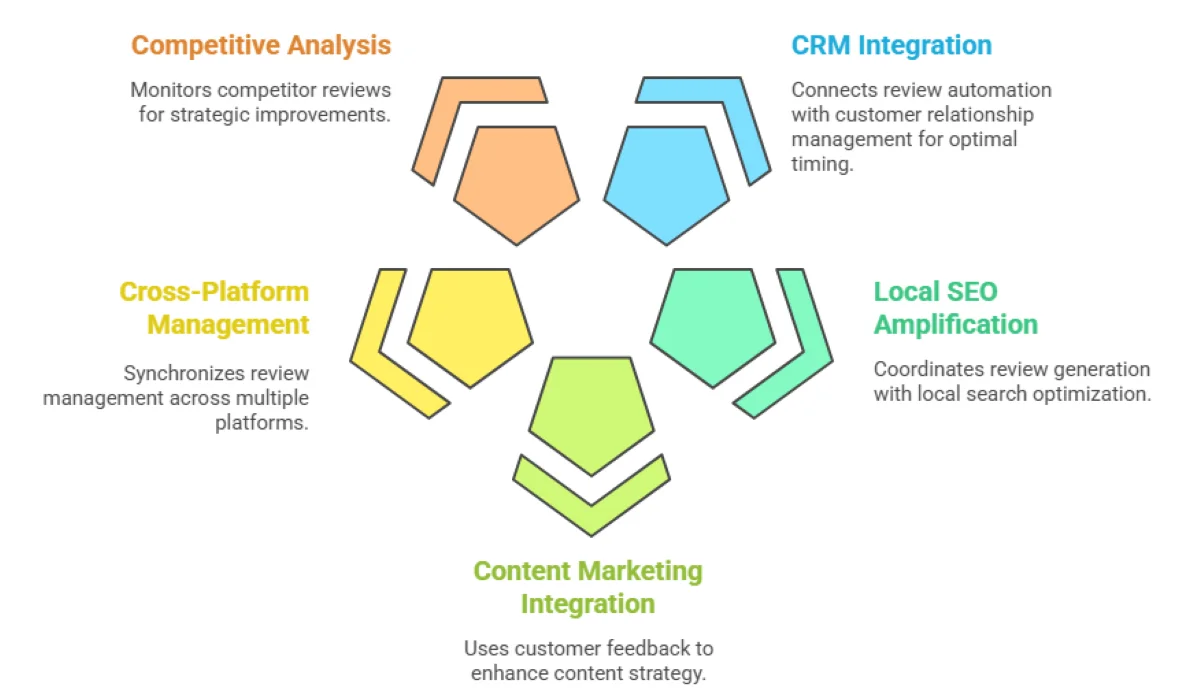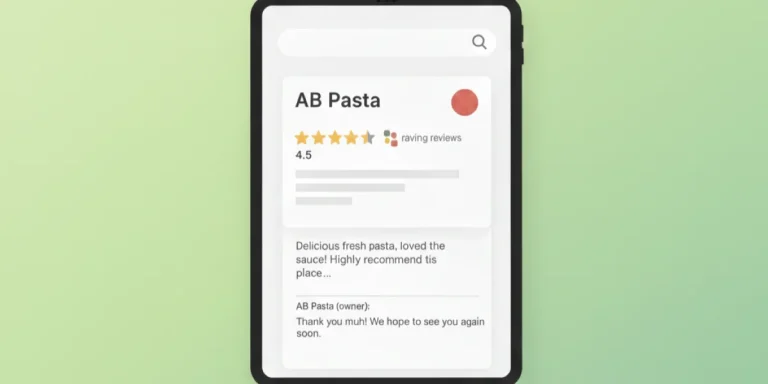
Every business owner knows the frustration of waiting for customers to leave reviews. They deliver exceptional service, solve problems, and exceed expectations, yet their Google Business Profile remains quiet while competitors with mediocre service somehow accumulate dozens of glowing testimonials. With automated review software, businesses can proactively request feedback at the right time, making it effortless for satisfied customers to share their experiences.
It’s a story countless entrepreneurs face daily: they know customers are satisfied because they keep coming back, refer friends, and praise the work in person. But when it comes to taking two minutes to leave a review online, even the happiest customers seem to vanish into thin air. Meanwhile, businesses watch competitors with questionable service quality consistently outrank them in local searches, simply because they have more reviews.
This creates a dangerous gap where online reputation doesn’t reflect actual service quality. The best businesses often have the quietest profiles, while average competitors dominate search results through sheer review volume. Automated review software bridges this gap by systematically converting satisfied customers into vocal advocates, helping businesses boost their Google rankings through consistent, authentic feedback collection and management.

Why reviews matter for Google rankings?
Reviews have evolved beyond simple customer feedback into powerful ranking signals that directly influence search visibility, local pack placements, and overall business credibility across multiple platforms and search scenarios.
Review velocity drives rankings
Fresh, regular reviews signal active business engagement to Google’s algorithms, often outweighing businesses with higher total review counts but infrequent activity patterns. Google’s algorithm prioritizes consistent publication of satisfying content, and this principle extends to review generation, maintaining consistent ranking momentum and visibility.
Response rates amplify SEO benefits
Businesses that actively respond to reviews demonstrate genuine engagement with customers, earning Google’s algorithmic rewards through improved search visibility. According to local SEO research, review signals account for 16% of local pack ranking factors, with response rates being a significant component of enhanced local ranking performance and increased credibility signals.
Multi-location scaling with automation
Enterprise businesses can maintain consistent review generation and response strategies across hundreds of locations without overwhelming their teams or compromising quality standards, ensuring uniform reputation management across their entire network.
Trust signals enhance CTR
Star ratings displayed prominently in search results create immediate credibility and trust, leading to significantly higher click-through rates and improved user engagement metrics. Research indicates that businesses with higher star ratings see substantially better performance in search results.
E-E-A-T strengthens through testimonials
User-generated review content provides Google with genuine experience signals, effectively reinforcing your business expertise, authoritativeness, and trustworthiness across all industry categories. Google’s E-E-A-T guidelines emphasize the importance of authentic user experiences, making customer reviews a critical component of search contexts.
What is automated review software?

Modern review automation platforms combine artificial intelligence, advanced workflow automation, and seamless multi-platform integrations. It systematically collects, manages, and strategically leverages customer feedback for sustained business growth.
Review request automation
Sophisticated systems automatically send personalized review requests via email or SMS after purchases, service completion, or positive customer interactions. Most customers write a review if they are asked to do so, maximizing response rates through strategic timing optimization.
AI-powered response systems
Advanced machine learning algorithms generate personalized, brand-consistent replies to customer reviews while intelligently flagging complex situations that require immediate human attention and thoughtful intervention for quality maintenance.
Cross-platform syndication
Leading automation platforms efficiently distribute and manage reviews across Google, Facebook, industry-specific review sites, and your business website from one centralized, user-friendly dashboard interface.
Real-time monitoring
Instant alert systems notify management teams of new reviews, especially negative feedback, enabling rapid response before issues escalate. Research shows that 53% of consumers expect businesses to respond to negative reviews within a week, making real-time monitoring crucial for reputation management.
Integration ecosystems
Modern automation solutions seamlessly integrate with existing CRM systems, email marketing platforms, and comprehensive business management software for streamlined operations and enhanced overall operational efficiency.
Benefits for SEO
Strategic review automation delivers measurable SEO improvements through increased online visibility, enhanced business credibility, and improved user engagement across multiple search scenarios for sustained organic growth.
Increased review velocity
Consistent, fresh reviews generated weekly significantly outperform sporadic review bursts, keeping your business actively engaged in Google’s local algorithm calculations. Google’s algorithm rewards consistent activity patterns for improved long-term visibility.
Higher response rates
Businesses maintaining higher review response rates than competitors gain significant search advantages, appearing more caring and trustworthy to potential customers browsing local search results.
Multi-platform presence
Strategic review distribution across Google, Facebook, and industry-specific sites creates a comprehensive online reputation. Google hosts 73% of all online business reviews, reinforcing business credibility from multiple authoritative sources for enhanced consumer trust.
Enhanced star ratings
Automated systems strategically target satisfied customers for review requests, naturally improving average rating scores and making business listings significantly more attractive to potential customers.
Data-driven insights
Advanced analytics reveal common customer praise points and recurring complaints, enabling strategic operational improvements that enhance both customer satisfaction and overall review quality.
How do automated reviews boost rankings?

Understanding the systematic approach to review automation helps maximize SEO benefits while maintaining authenticity and strict compliance with platform guidelines for sustainable results.
Phase 1: Strategic collection
Strategic review collection focuses on optimal timing, precise customer targeting, and authentic personalization to maximize genuine feedback from satisfied customers while maintaining ethical standards.
Timing optimization
Send review requests 24-48 hours after positive customer interactions when satisfaction peaks, avoiding immediate post-purchase timing that feels pushy, aggressive, or overly sales-focused to recipients. Research indicates that timing impacts review response rates.
Customer segmentation
Utilize comprehensive purchase history, support interaction ratings, and engagement metrics to identify customers most likely to leave positive reviews for optimal campaign outcomes.
Multi-channel requests
Combine strategic email, SMS, and in-app notification approaches, allowing customers to choose their preferred communication method for review submission and improve response rates.
Personalized messaging
Include specific details about customer purchases or service experiences, making review requests feel genuinely personal rather than automated mass communications that customers typically ignore.
Follow-up sequences
Strategic gentle reminders sent 3-7 days later can capture additional valuable reviews from customers who initially overlooked the original request without being aggressive or violating platform policies.
Phase 2: Quality management
Effective response management strategically combines AI automation with human oversight to maintain authentic customer engagement while ensuring every customer feels heard and valued.
AI-powered responses
Advanced algorithms learn your unique brand voice and generate personalized replies that feel genuinely human while ensuring every customer review receives prompt acknowledgment and appropriate engagement.
Sentiment analysis
Automated systems intelligently flag negative reviews or complex customer issues for immediate human attention while handling straightforward positive feedback automatically and efficiently.
Cross-platform syndication
Strategically distribute customer reviews to your business website, social media platforms, and marketing materials, maximizing SEO benefits and credibility across all digital touchpoints.
Response templates
Different automated response templates for 5-star reviews, detailed feedback, customer complaints, and neutral reviews ensure appropriate tone and messaging for each situation while maintaining authenticity.
Real-time escalation
Critical customer issues trigger immediate notifications to management teams, enabling rapid response before negative reviews significantly impact search rankings and business reputation.
Phase 3: SEO optimization
Advanced SEO optimization leverages review data and customer engagement to improve search rankings through multiple ranking factors and enhanced user experience signals.
Local pack visibility
Fresh customer reviews and prompt responses signal active business operations to Google, helping maintain and improve local search rankings. Google Business Profile signals make up 32% of local pack ranking factors, making review management crucial for visibility.
Keyword integration
Customers often naturally use relevant search terms in their reviews, creating valuable long-tail keyword associations that strengthen your business’s search relevance and help with local search matching.
Click-through rate enhancement
Review stars prominently displayed in search results create immediate trust signals, leading to higher click-through rates and improved ranking signals for Google’s algorithms.
Schema markup optimization
Properly structured review data helps search engines display star ratings and review counts in search results, enhancing visibility and click-through performance through rich snippets.
User engagement metrics
Higher click-through rates and more extended site visits from review-driven traffic send positive engagement signals to Google’s ranking algorithms for improved overall performance.
Choosing the right software for review management
Selecting optimal review automation software requires careful evaluation of features, compliance capabilities, and integration options that align with your specific business requirements and budget constraints.
Core features checklist
Essential features include AI sentiment analysis, Google Business Profile integration, multi-platform support, custom branding options, built-in compliance safeguards, and comprehensive analytics dashboards for performance tracking.
Industry-specific considerations
Healthcare businesses require HIPAA compliance, SaaS companies need robust integration capabilities, while multi-location enterprises need centralized management with location-specific customization options and reporting.
Implementation timeline
Consider onboarding complexity, team training requirements, and gradual rollout options to minimize operational disruption while maximizing user adoption and long-term success rates across your organization.
Compliance and best practices
Maintaining ethical review practices while leveraging automation ensures long-term success without risking penalties or platform violations that could damage rankings and business reputation.
Google guidelines compliance
Understanding and adhering to platform policies prevents costly penalties while building sustainable review generation strategies that comply with evolving platform requirements and algorithm updates.
Policy adherence
Google requires customer reviews to be genuine and unsolicited, making it crucial to automate requests and responses while avoiding fake review generation or manipulation tactics.
Recent enforcement trends
Google’s algorithm updates increasingly detect and penalize inauthentic review patterns, making built-in compliance safeguards essential for sustainable long-term strategies.
Authenticity verification
Use customer data verification, purchase confirmations, and service records to ensure all review requests go to legitimate customers who actually used your services or products.
Ethical automation practices
Implementing ethical automation strategies maintains business integrity while maximizing legitimate review generation through customer satisfaction rather than manipulation tactics or policy violations.
Authentic feedback encouragement
Focus on making the review process convenient rather than incentivizing specific ratings or manipulating customer sentiment through rewards, pressure tactics, or misleading communications.
Timing ethics
Allow reasonable intervals between purchases and review requests, avoiding aggressive follow-up sequences that could annoy customers or appear desperate for feedback to platform algorithms.
Personalization without manipulation
Customize requests based on actual customer experiences while avoiding emotional manipulation or inappropriate pressure tactics for positive reviews or specific rating targets.
AI-assisted response practices
Leveraging artificial intelligence for review responses requires careful implementation to maintain authenticity while achieving scale and consistency in customer communications across all platforms.
Brand voice consistency
Train AI systems on existing customer communications to ensure automated responses match your established tone and messaging style for consistent brand representation across all interactions.
Personalization at scale
Use customer data to reference specific purchases, services, or interactions in automated responses without appearing robotic, generic, or impersonal to recipients or other readers.
Response template optimization
Continuously test and refine automated responses based on customer reactions and engagement metrics to maintain effectiveness and authenticity over time while improving performance.
Advanced strategies and integration

Sophisticated review automation strategies integrate with broader marketing and SEO efforts, creating synergistic effects that amplify overall digital presence and business performance across multiple channels.
CRM integration
Connect review automation with customer relationship management systems to trigger requests at optimal points in the customer journey, maximizing effectiveness and ensuring proper timing for maximum response rates.
Local SEO amplification
Coordinate review generation with Google Business Profile optimization, local citations, and location-based content marketing for comprehensive local search dominance. Local SEO campaigns typically yield over 500% ROI after three years when properly implemented.
Content marketing integration
Use common customer praise and concerns from reviews to create blog content, FAQs, and service descriptions that address real customer needs and improve overall content strategy effectiveness.
Cross-platform reputation management
Synchronize review management across Google, Facebook, industry directories, and review sites for unified online reputation strengthening and brand consistency maintenance across all digital touchpoints.
Competitive analysis
Monitor competitor review patterns, response strategies, and customer feedback to identify service gaps and positioning advantages for strategic business improvements and market differentiation opportunities.
Future of reviews in SEO
Emerging technologies and algorithm updates will reshape how reviews influence search rankings, requiring adaptive strategies for sustained competitive advantage.
Google AI evolution
Advanced machine learning algorithms increasingly distinguish between authentic customer feedback and manipulated reviews, rewarding genuine engagement over artificial volume generation tactics and penalizing suspicious patterns more effectively.
Generative AI transformation
AI tools will provide more sophisticated response generation, sentiment analysis, and predictive insights while maintaining authenticity and personalization for customer interactions across multiple platforms and languages.
Voice search integration
As voice queries grow, review text becomes more important for answering conversational questions about business quality and services in natural language, making detailed reviews increasingly valuable for search visibility.
Predictive analytics
Future platforms will predict potential reputation issues and automatically adjust collection strategies to maintain positive momentum and prevent reputation crises proactively through advanced data analysis and trend identification.
Broader AI integration
Reviews will increasingly influence AI-generated search results, featured snippets, and business recommendations across Google’s expanding AI ecosystem and future developments in search technology and user experience.
How does Spreadical approach AI-powered Google review management?
Spreadical represents a new approach to review management that combines automation with authentic customer engagement. Rather than simply pushing for more reviews, the platform focuses on helping businesses maintain meaningful conversations with their customers while streamlining administrative tasks.
Automated review monitoring
Spreadical’s system continuously monitors Google Business profiles, providing real-time alerts when new reviews appear. Moreover, this eliminates the daily routine of manually checking for feedback across multiple locations, allowing business owners to focus on operations while staying informed about customer sentiment.
AI-assisted response crafting
The platform analyzes incoming reviews for sentiment and context, then generates response suggestions that align with the business’s established voice. These aren’t generic templates but contextual replies that address specific points raised by customers, helping maintain authentic engagement at scale.
Adaptive learning capability
Spreadical’s AI learns from business owners’ preferences over time. As users approve, edit, or reject suggested responses, the system adapts to better understand the brand’s communication style, industry nuances, and preferred approaches to different types of feedback.
WhatsApp integration for mobility
Recognizing that business owners aren’t always at their computers, Spreadical integrates with WhatsApp for mobile review management. In addition, this allows quick response approval or editing from anywhere, ensuring customer feedback receives timely attention regardless of location or schedule.
Data organization
Beyond immediate response management, Spreadical stores all reviews and responses in searchable cloud storage. This creates a valuable database for identifying trends, tracking improvement areas, and maintaining records for compliance or analysis purposes.
FAQs
1. Do reviews help improve Google rankings?
Yes, reviews significantly impact Google rankings through multiple factors, including review velocity, star ratings, and customer engagement. Review signals account for 16% of local pack ranking factors according to SEO research, and Google uses reviews as trust signals for both local and organic search results.
2. What is automated review software?
Automated review software uses AI and workflow automation to systematically collect, manage, and respond to customer reviews across multiple platforms. Along with that, these tools streamline the entire review management process while maintaining authenticity and compliance with platform guidelines, helping businesses generate more reviews consistently.
3. How does automated review software boost SEO?
Review automation boosts SEO by increasing review velocity, improving response rates, and maintaining consistent engagement with customers. These factors signal business activity and credibility to search engines, resulting in better rankings, particularly for local search results and Google Business Profile visibility.
4. Can ai review software improve local search rankings?
Yes, automated review software particularly benefits local search rankings by generating consistent reviews, improving response rates, and maintaining active Google Business Profile engagement. Google Business Profile signals make up 32% of local pack ranking factors, making review automation especially valuable for local businesses seeking improved visibility.
5. Is it safe to use automated review software for Google reviews?
Yes, when used ethically and in compliance with platform guidelines, automated review software is safe and effective. Google requires reviews to be genuine and unsolicited, so the key is focusing on authentic customer outreach rather than manipulating review content or ratings, while avoiding patterns that could trigger spam detection.
6. What features should I look for in review automation tools?
Essential features include Google Business Profile integration, AI-powered responses, multi-platform support, compliance safeguards, analytics dashboards, and CRM integration. Industry-specific needs may require additional specialized features like HIPAA compliance for healthcare businesses or multi-location management for enterprise companies.
7. How often should businesses collect new reviews?
Optimal review velocity varies by business size and customer volume, but most businesses benefit from 1-4 new reviews per week. Consistency matters more than volume for SEO benefits, making steady generation more valuable than sporadic bursts while avoiding suspicious patterns.
8. Can customer reviews increase website traffic?
Yes, reviews increase website traffic by improving search rankings, enhancing click-through rates through star ratings, and building trust that encourages clicks. Reviews also provide content that helps with long-tail keyword rankings and local search visibility, creating multiple pathways for increased organic traffic.
9. What are the risks of fake or spammy reviews?
Fake reviews can result in Google penalties, profile suspension, and long-term ranking damage. Google’s algorithms are becoming increasingly sophisticated at detecting fake reviews, and they also risk customer trust and can backfire when detected, making authentic automation strategies essential for sustainable success.
10. How will Google AI impact review-based SEO in the future?
Google’s AI will become better at detecting authentic versus manipulated reviews, emphasizing quality over quantity. Future algorithms will likely weight recent reviews more heavily and analyze review content more sophisticatedly for ranking decisions, making authentic review generation increasingly important for long-term success.
Disclaimer: Google’s algorithms and policies change frequently. Always verify current guidelines and best practices before implementing any review automation strategy. Results may vary based on industry, competition, and implementation quality.


